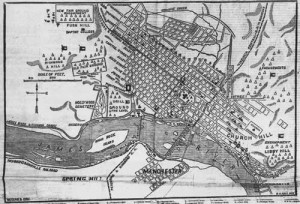In the southern city of Richmond, Virginia, an ordinance outlawing the sale of liquor on Sundays is enacted. Any establishment selling alcoholic beverages is now forced to close at 10 PM and not allowed to open on Sundays.
In the decades prior to the war, led by women – particularly religious women, and especially in the North – the temperance movement made significant inroads in American life. The early and mid-nineteenth century witnessed significant growth in the consumption of alcohol in America, with attendant problems associated with drunkenness on the part of men. Failure to provide for families and abuse of women led female reformers to push for curbs on the consumption of alcohol. The movement also made inroads into the South. By 1860, drunkenness of white male members is one of the most common disciplined offenses in Baptist congregations of the South.
And then comes the Civil War.
While many white southern Christians praise the righteousness of Confederate troops, a harsher reality is emerging: army camps provide even greater opportunity for white southern men to imbibe liberally.
Against the backdrop of an early awareness of drunkenness in southern cities and army camps, the city of Richmond – daily host to area soldiers on their days off – thus begins to restrict the sale of alcohol. Nonetheless, many business owners, and some religious figures (Baptists at this time remain welcoming of alcohol in general, although opposed to drunkenness) are angered at the new law, some fearing that full-scale prohibition lies ahead.
While the war years slow the momentum of the larger temperance movement, alcohol abuse among southern soldiers grows worse as the war progresses, much to the chagrin of many religious leaders and home front families.
Source: “Temperance Begins in Richmond” (link)



